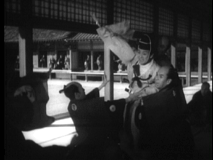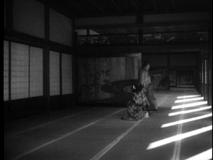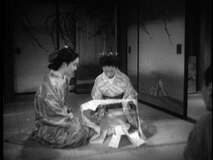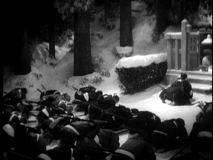The 47 Ronin, Parts One &
Two (Kenji Mizoguchi) 1941-1942
 The 47 Ronin, Kenji Mizoguchiís august jidai-geki
(period film) is difficult to view without proper awareness of its cultural
context. Conceived as a propaganda picture that would rally a Japan on the brink
of World War II, it doesnít push the same ideological buttons of Western
political films. Instead of relying on gung-ho rallying and reminders of the
benefits of a way of life that might be encroached upon by outside forces, it
attempts to instill the dignity inherent in a death without disgrace. Itís not
a viewing experience with nothing to offer foreign viewers, however, as the
drama, which deals with the aftermath of a squabble between a Lord and a Master
of Ceremonies, is generally gripping, and the filmmaking top notch. The
transcendental style that Paul Schrader popularized was originally applied to
Ozu, Bresson, and Dreyer, but more than a trace of the elements discussed can be
found in Mizoguchiís film. Virtuoso long takes (which are even more remarkable
considering the filmís age) and an impressively austere lack of pizzazz are
the filmís stylistic touchstones.
The 47 Ronin, Kenji Mizoguchiís august jidai-geki
(period film) is difficult to view without proper awareness of its cultural
context. Conceived as a propaganda picture that would rally a Japan on the brink
of World War II, it doesnít push the same ideological buttons of Western
political films. Instead of relying on gung-ho rallying and reminders of the
benefits of a way of life that might be encroached upon by outside forces, it
attempts to instill the dignity inherent in a death without disgrace. Itís not
a viewing experience with nothing to offer foreign viewers, however, as the
drama, which deals with the aftermath of a squabble between a Lord and a Master
of Ceremonies, is generally gripping, and the filmmaking top notch. The
transcendental style that Paul Schrader popularized was originally applied to
Ozu, Bresson, and Dreyer, but more than a trace of the elements discussed can be
found in Mizoguchiís film. Virtuoso long takes (which are even more remarkable
considering the filmís age) and an impressively austere lack of pizzazz are
the filmís stylistic touchstones.
 The camera glides gracefully from beautifully framed setup to
setup, obsessing on the architecture as much as its inhabitants, and at first
the directorís series of stately compositions seems the wrong approach for the
material, which has a multitude of turbulent emotions at its core. Soon it
becomes apparent, however, that the environment is defining the emotions of the
characters, and the way that the camera tracks after them, forcing them into a
frame, represents their settingís suppression of their emotions and their
inability to escape from those trappings. They are all obligated by a societal
sense of honor and there are no close-ups in the film because weíre not privy
to the feelings that exist within the vacuum of an individualís mind.
Everything that people say here has been passed through the filters of what is
publicly acceptable and appropriate. The actions of the characters only make
sense when placed in the proper context, making a relatively simple morality
play more difficult for those of us who arenít Japanese.
The camera glides gracefully from beautifully framed setup to
setup, obsessing on the architecture as much as its inhabitants, and at first
the directorís series of stately compositions seems the wrong approach for the
material, which has a multitude of turbulent emotions at its core. Soon it
becomes apparent, however, that the environment is defining the emotions of the
characters, and the way that the camera tracks after them, forcing them into a
frame, represents their settingís suppression of their emotions and their
inability to escape from those trappings. They are all obligated by a societal
sense of honor and there are no close-ups in the film because weíre not privy
to the feelings that exist within the vacuum of an individualís mind.
Everything that people say here has been passed through the filters of what is
publicly acceptable and appropriate. The actions of the characters only make
sense when placed in the proper context, making a relatively simple morality
play more difficult for those of us who arenít Japanese.
 As ronin, samurai without a master, the vassals of the
deposed Lord Asano are placed in a precarious situation in which they canít
reap the benefits of being bound to their master but cannot swear allegiance to
another, since that would seem a betrayal of Asanoís honor. They ultimately
have no choice but to seek revenge, and the hopelessness of their situation
exposes a fallacy in their beliefs. Since they really are bound by a sense of
honor to avenge their master, and since their society provides no other
principled course of action, it seems at times as if their actions arenít
honorable because they make an exception to the rules, but instead tragic
because they must conform to them so readily. The most important character arc
in the film is that of the Chamberlain Oishi (Chojuro Kawarasaki) whose
halfhearted attempts to petition the government for a peaceful resolution to the
situation are embraced by public sentiment, resulting in an ironic situation in
which he must put up even more pretenses in order to hide the groupís
plotting.
As ronin, samurai without a master, the vassals of the
deposed Lord Asano are placed in a precarious situation in which they canít
reap the benefits of being bound to their master but cannot swear allegiance to
another, since that would seem a betrayal of Asanoís honor. They ultimately
have no choice but to seek revenge, and the hopelessness of their situation
exposes a fallacy in their beliefs. Since they really are bound by a sense of
honor to avenge their master, and since their society provides no other
principled course of action, it seems at times as if their actions arenít
honorable because they make an exception to the rules, but instead tragic
because they must conform to them so readily. The most important character arc
in the film is that of the Chamberlain Oishi (Chojuro Kawarasaki) whose
halfhearted attempts to petition the government for a peaceful resolution to the
situation are embraced by public sentiment, resulting in an ironic situation in
which he must put up even more pretenses in order to hide the groupís
plotting.
 Such ethical complexity makes the film feel better than the simple propaganda
film the government intended it to be and the mere historic recounting of events
that if sometimes feels like due to its obsession with ceremony. When a woman in
disguise shows up in the last reel, she asks many of the questions (Is honor
really that important? What about the loved ones of the samurai?) that had been
niggling at the audience for the filmís running time. Though her presence
makes the film feel, for the first time, a tad melodramatic it also finally
alleviates the feeling that the screenwriters were utterly unaware of the
concerns of laypeople. Although Mizoguchiís tendency to keep the majority of
the action off screen sometimes frustrates, it allows the focus of the film to
stay on the politics and plotting. The relatively muted tone of The 47 Ronin doesnít
prevent the ending from having emotional impact, however. The bravery and
stoicism that they show in their final moments is universally recognizable.
Such ethical complexity makes the film feel better than the simple propaganda
film the government intended it to be and the mere historic recounting of events
that if sometimes feels like due to its obsession with ceremony. When a woman in
disguise shows up in the last reel, she asks many of the questions (Is honor
really that important? What about the loved ones of the samurai?) that had been
niggling at the audience for the filmís running time. Though her presence
makes the film feel, for the first time, a tad melodramatic it also finally
alleviates the feeling that the screenwriters were utterly unaware of the
concerns of laypeople. Although Mizoguchiís tendency to keep the majority of
the action off screen sometimes frustrates, it allows the focus of the film to
stay on the politics and plotting. The relatively muted tone of The 47 Ronin doesnít
prevent the ending from having emotional impact, however. The bravery and
stoicism that they show in their final moments is universally recognizable.
* * * 1/2
04/29/02
Jeremy Heilman